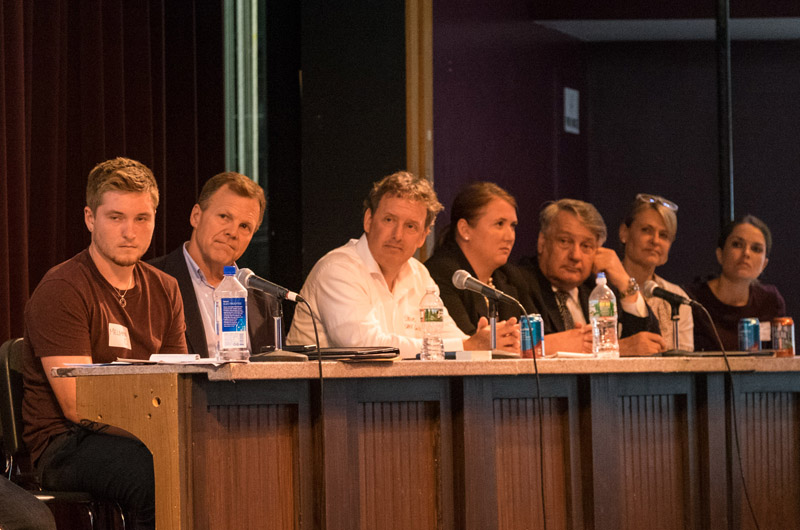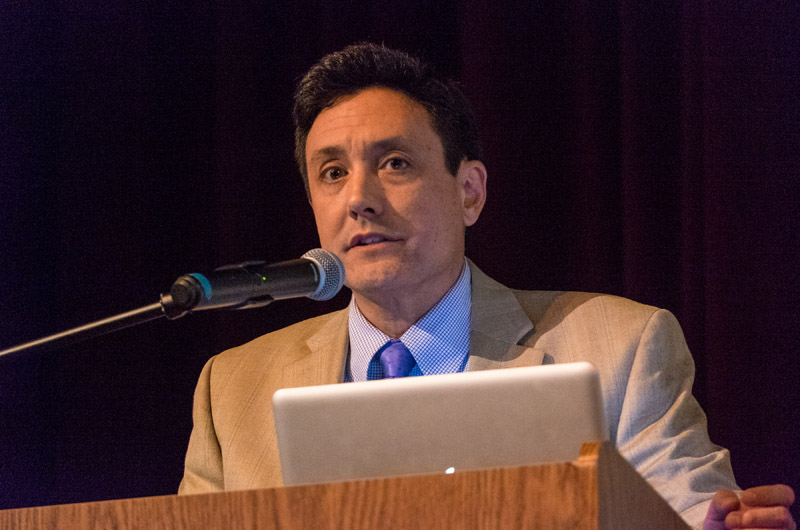A broad committee of public service organizations, law enforcement, activists and recovering addicts joined forces for a community forum Monday evening, determined to shape a more effective strategy to combat heroin addiction on Martha’s Vineyard.
The overriding theme of the evening was an effort to organize a collaborative approach. According to a survey of people involved in treatment and recovery efforts, there is a strong consensus that despite the best efforts of those trying to help, resources on the Island have been overwhelmed by a sharp increase in addiction and overdoses in the past two years, mirroring a state and national trend. The survey, conducted by the Dukes County Health Council, found that most stakeholders rate the current resources for treatment poor or unacceptable.
Assistant school superintendent Richard Smith moderated the forum at the Performing Arts Center before about 250 people. He set the tone for the evening.
“We don’t want people to walk away feeling this is just another meeting with no action,” Mr. Smith said.
First to speak were three recovering addicts affiliated with Narcotics Anonymous on Martha’s Vineyard. The leader of the group asked that the Gazette not use their names.
Each told a heart-wrenching story of addiction, and an inspiring story of long-term recovery. Among them was an Island resident who said his background included a top New England prep school, an Ivy League College and a narcotics addiction that nearly cost him his life. He said he has been clean for 16 years. “What we represent is a lot of hope,” he said. “I suspect there are some people here who need some hope. I wasn’t, in the end, alive in any sense of the world. I knew for sure I was better off dead.”

Several speakers emphasized the need to view addiction as a disease. Among them was Jim Derick, president of Support for Addicts and Families by Empowerment (SAFE), a grass roots community coalition which provides information and referrals. The organization covers six towns in Norfolk and Worcester counties.
“Imagine that — six different towns could do one program,” said West Tisbury police chief Dan Rossi, who introduced Mr. Derick. “What a concept.”
Mr. Derick said the group has seen substantial success in getting addicts into treatment, through confidential drop-in centers and a telephone hotline, but that the stigma of drug addiction still prevents some from seeking treatment. He ticked off a number of large hospitals in Boston that specialize in specific diseases like cancer, diabetes and heart disease.
“Show me a substance abuse clinic with a big sign downtown,” Mr. Derick said. “You don’t find them. I don’t see them.”
Also active in the SAFE coalition is Steve Spiewakowski, a probation officer at the Wrentham district court. He said when he began his career, his job never involved dealing with a heroin overdose. That changed over the past decade.
“I’m seeing people that I know, die,” Mr. Spiewakowski said. “I came to the conclusion over my career that jailing addicts does not help them, or us. These are not statistics, these are not numbers, these are people.”
Catherine Dotolo, of Gosnold Cape Cod, a substance abuse disorder treatment facility where many Island residents receive care, also emphasized the clinical nature of drug addiction. She showed brain scans that illustrated the effect of addiction, and long-term nature of recovery. She said treating addiction like a disease is important in the context of relapse.
“If someone had a second heart attack, would we turn them away? No,” said Ms. Dotolo. “Areas of the brain are hijacked by these substances. If you were in an airplane that was hijacked, you have no control. Willpower cannot overcome the brain changes.”
Cape and Islands assistant district attorney Eileen Moriarty answered a question about whether laws aimed at drug dealers are being enforced.
“It’s not that the laws aren’t being enforced,” she said. “It’s that it’s sometimes difficult to enforce those laws. It’s a labor-intensive type of thing. Of course law enforcement wants to arrest people, but they also need to make sure they do it within the boundaries of the law. Unfortunately it’s not just as easy as arresting people.”
Martin V. (Skip) Tomassian Jr., president of the Dukes County Bar Association, offered information about a free legal service for civil commitment, also known as section 35. The legal procedure forces addicts into treatment. He said the Massachusetts Bar Association has established a telephone hotline (844-843-6221) that offers free legal advice for families considering that option.
During a brief question-and-answer session following the presentations, questions surfaced about establishing a medical detoxification program on the Island, so that people who are ready for help do not have to wait for an open bed off-Island.
“I think there is certainly a need for that to be investigated,” said Amy Houghton, director of human resources for Martha’s Vineyard Community Services. “That’s what this group, in our initial proceedings, we’ve talked about that and a lot of investigation has to be done as to whether or not that’s something that could happen, or whether there’s a version that could happen on the Island, and the economies of doing that.”
“I don’t think it’s a question of whether we want it or not,” said Christine Todd, a county commissioner who made a public appeal several weeks ago for help in treating her daughter for addiction. “I think we need it. I think our community is demanding that. We need to find a way to make it happen. I want to see what we can do now, and not think about it and plan for it down the road. I think we need a MASH unit, or a pop up detox center, a temporary solution to a long-term fix,” she said.
Ms. Houghton wrapped up the evening with a pledge to turn the ideas presented into action. People who attended the forum received a packet of information, and a blue “action” card to write down questions and suggestions.
She said organizers of the forum will hold the first of a series of planned follow-up sessions on June 9 to evaluate the written comments, prioritize the next steps and form work groups.









Comments (1)
Comments
Comment policy »